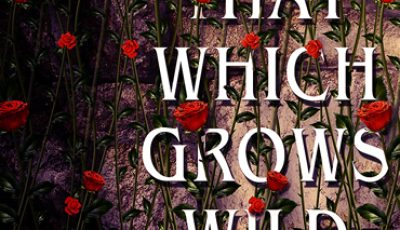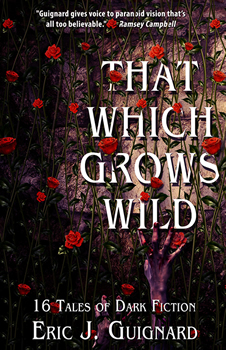

That Which Grows Wild: 16 Tales of Dark Fiction by Eric J. Guignard
 By Dawn Ius
By Dawn Ius
Putting together a collection of short stories is no easy task —there’s a process the author goes through to determine the criteria. A theme, a genre, or even, in the case of Eric Guignard’s THAT WHICH GROWS WILD, the most logical grouping of 16 previously published works culled from a list of about 70.
Guignard worked with an editor at Cemetary Dance to select titles that showed a diverse range of topics, while at the same time ensuring the collection didn’t veer too far off course — less satire, more mood, for instance.
The result is a page-turning corpus of dark tales that shy away from cliched monsters and glorified gore, and instead provide chilling perspective on horror and heartbreak, hope and atonement, and the emotional despair of oblivion.
“I enjoy thrills of all kinds, whether the ghosts and monsters of horror, or the shoot-em-up of military conquest; the excitement and wanderlust of adventure tales, or bleak mayhem in noir gangster epics. They each inspire and ‘thrill’ me in different ways,” Guignard says. “Regardless of how the genre has changed, I try to write stories that have meaning to me, and, I hope, to the reader, whether tales of woe, mystery, or strange fancy.”
That’s certainly the case in THAT WHICH GROWS WILD, whose stories give fresh looks at often tiresome tropes. “Last Days Of The Gunslinger, John Amos,” for examples, features a shoot-out between a cowboy and an alien, in a flood. A woman with an infected eye is able to see germs in “Certain Sights Of An Affected Woman.” With each chilling tale, Guignard taps into the human psyche and tackles issues of the day—such as opium addiction in “The House of the Rising Sun, Forever”—making this collection not only timely, but deeply compelling.
Guignard makes it look easy—but he’s the first to admit, it isn’t.
“Often my writing takes forever to do, and I have to tear words out like pulling teeth, though usually it’s because I want to ‘force’ the story to go one way or for it to have a certain feel, but I can never quite fit it into the box I envision,” he says. “But then sometimes I can knock them out in a couple days. I should probably treat those ones as coming-of-mind personal recognition experiences, letting a story go where it wants, in that it’s easier, faster, and more enjoyable.”
“Footprints Fading in The Desert” was like that, a story Guignard wrote in about a week, despite a lack of direction and a last-minute inspired ending.
“I recall thinking at the time that I liked it, but I had no idea how to end it, and it’d probably go into the rubbish bin,” he says, adding that in reality it became one of his favorite “early” published stories. “It was accepted in the first market I submitted to, and the editor told me it had beat out over 1,000 other stories, which pleased me to no end!”
From THAT WHICH GROWS WILD, “A Curse and a Kiss” was written the fastest, and in contrast, “Those Who Watch From On High” took the longest, thanks to several months of “mind-numbing research on military drone pilots and PTSD.”
While the book is Guignard’s debut collection of published short stories, he’s no stranger to the format. In addition to penning and publishing more than 70 thrilling tales, Guignard has edited several anthologies, most recently The Five Senses of Horror.
But that doesn’t mean he’s married to bite-sized fiction. His novella, Baggage of Eternal Night—which was nominated for an ITW Thriller Award—represents his longest published work to date, but he’s currently shopping a book that has taken him four years and 120,000 words to write.
“I have several other novels begun, but not gotten too far in because I keep losing interest and want to write a short story, or engage in another project,” he says. “I probably spread myself too thin, but that’s for better as well as worse.”
Readers of THAT WHICH GROWS WILD are likely to concur, it’s most definitely for the better.
*****
 Eric J. Guignard is a writer and editor of dark and speculative fiction, operating from the shadowy outskirts of Los Angeles, where he also runs the small press, Dark Moon Books. He’s won the Bram Stoker Award, been a finalist for the International Thriller Writers Award, and a multi-nominee of the Pushcart Prize.
Eric J. Guignard is a writer and editor of dark and speculative fiction, operating from the shadowy outskirts of Los Angeles, where he also runs the small press, Dark Moon Books. He’s won the Bram Stoker Award, been a finalist for the International Thriller Writers Award, and a multi-nominee of the Pushcart Prize.
His stories and non-fiction have appeared in over one hundred genre and literary publications such as Nightmare Magazine, Black Static, Shock Totem, Buzzy Magazine, and Dark Discoveries Magazine. As editor, Eric’s published six anthologies including (amongst others) Dark Tales of Lost Civilizations, After Death… and A World of Horror, a showcase of international horror short fiction.
Additionally he’s created an ongoing series of primers exploring modern masters of literary dark short fiction, titled Exploring Dark Short Fiction (Vol. 1: Steve RAsnic Tem; Vol. II: Kaaron Warren; Vol. III: Nisi Shawl; Vol. IV: Jeffrey Ford).
Read his standalone novella, Baggage of Eternal Night (Journalstone), and watch for his first novel, Crossbuck ‘Bo, which is currently being shopped around.
Outside the glamorous and jet-setting world of indie fiction, Eric’s a technical writer and college professor, and he stumbles home each day to a wife, children, cats, and a terrarium filled with mischievous beetles.
Visit Eric on his website, blog and Twitter (@ericjguignard).
- On the Cover: Alisa Lynn Valdés - March 31, 2023
- On the Cover: Melissa Cassera - March 31, 2023
- Behind the Scenes: From Book to Netflix - March 31, 2023
